- Home
- James Clavell
Whirlwind Page 19
Whirlwind Read online
Page 19
The tower was small with glass windows on all sides and well equipped. This had been their permanent base for many years, so S-G had had time to fit it out with some modern air safety and all-weather landing aids. Freddy Ayre, senior pilot in Starke’s absence, was waiting for Manuela.
“HXB’s on final,” he said as she came up the stairs. “He—”
“Oh, wonderful,” she interrupted happily. They had been trying to contact Starke all day without success: “Not to worry,” Ayre had told her, “their HF often goes out, same’s ours.” Since last night, just after dark, the only communication had been Starke’s terse report that he was overnighting at Bandar Delam and would contact them today.
“Sorry, Manuela, but Duke’s not aboard, Marc Dubois’s flying her.”
“There’s been an accident?” she burst out, her world tumbling. “He’s hurt?”
“Oh, no, nothing like that. When Marc reported in a few minutes ago, he said Duke had stayed behind at Bandar Delam and he’d been told to fly the mullah and his team on the return trip.”
“Is that all? You’re sure?”
“Yes. Look,” Ayre said, pointing out of the window, “there she is.”
The 206 was coming out of the sun nicely. Behind her the Zagros Mountains reached skyward. Below were the chimney stacks of the vast refinery, plumes of fire from waste gases perpetually burning off. She touched down in the exact center of Landing Pad One. “HXB shutting down,” Marc Dubois said over the radio.
“Roger, HXB,” S-G’s duty tower operator, Massil Tugul, a Palestinian and longtime employee, replied. He switched to the main base frequency. “Base, we have no birds in the system now. I confirm HVU and HCF will return before sunset.”
“Okay, S-G.” There was a moment of quiet, then over the main base channel, they heard a voice cut in harshly in Farsi, transmitting from the 206. It went on for half a minute, then ceased.
Massil muttered, “Insha’Allah!”
“Who the hell was that?” Ayre said.
“The mullah Hussain, Agha.”
“What the hell did he say?” Ayre asked him, forgetting Manuela could speak Farsi.
Massil hesitated. Manuela answered for him, her face white. “The mullah said, ‘In the Name of God and in the Name of the Whirlwind of God, strike!’ over and over, just ov—” She stopped.
From the other side of the airfield came the muted sound of gunfire. At once Ayre took the mike. “Marc, à la tour, vite, immédiatement,” he ordered, his accent excellent, then squinted at the base, half a mile away. Men were running from their barracks now. Some carried guns. Several fell as other men opposed them. Ayre opened one of the windows to hear better. Faint shouts of “Allah-u Akbarrr” mixed with the coarse thrangg-thrangg-thrangg of automatic rifles.
“What’s that? Near the gate, the main gate?” Manuela said, Massil on his feet beside her, equally shocked and not a little frightened.
Ayre reached for the binoculars and focused them. “Christ Almighty, soldiers’re firing into the base and…and trucks’re storming the gate…half a dozen of them… Green Bands and mullahs and soldiers jumping out of them…”
Over the base channel came an excited voice shouting in Farsi that was abruptly cut off. Again Manuela translated: “‘In the Name of God, kill all officers who oppose Imam Khomeini and take possession—’ It’s revolution!”
Below they saw the mullah Hussain and his two Green Bands pile out of the 206, guns unslung. The mullah motioned Dubois out of the cockpit, but the pilot just shook his head and pointed at the whirling blades, continued shutdown procedure. Hussain hesitated.
All over the S-G compound work had stopped. People were leaning out of windows or had come out onto the tarmac and were standing there in silent little groups, looking across the field. Sounds of gunfire increased. Nearby, the jeep and fuel truck that were to service the 206 had skidded to a halt the moment the guns had started. Hussain had hailed the jeep, left one man to guard the chopper. The driver saw him coming, jumped out, and took to his heels. The mullah cursed him and, with a Green Band, got into the driving seat, gunned the engine, and tore off down the boundary road, heading for the far barracks.
Dubois came up the steps, three at a time. He was thirty-six, tall and skinny, with dark hair and a roguish smile. At once he stuck out his hand and shook with Ayre. “Madonna, what a day, Freddy! I… Manuela!” He kissed her fondly on both cheeks. “The Duke is fine, chérie. He just had a row with the mullah who told him that he would no longer fly with him. Bandar Delam’s not…” He stopped, very conscious now of Massil, not trusting him. “I need a drink, eh? Let’s go to the mess, eh?”
They did not go to the mess. Marc led them out onto the tarmac and into the lee of a building where they could watch with safety and not be overheard. “There’s no way of telling which side Massil’s on, eh, or even most of our staff—if they even know themselves, poor people.”
On the other side of the field there was a loud explosion. Fire gushed from one of the sheds and smoke billowed. “Mon Dieu, is that the fuel dump?”
“No, just near it.” Ayre was filled with disquiet. Another explosion distracted him, then mixed with sporadic gunfire came the heavy, deep-throated detonation of a tank’s big gun.
The jeep with the mullah in it had disappeared behind the barracks. Near the main gate, the army trucks had stopped haphazardly; their attacking soldiers and Green Bands vanished into hangars and barracks. A few bodies lay in the dust. Tank soldiers guarding Camp Commandant Peshadi’s office block crouched near the doorway, their guns ready. Others waited at the second-floor windows. One of the men there let off a burst of automatic fire as half a dozen screaming soldiers and airmen charged in attack across the square. Another burst of fire and they were all dead or dying or badly wounded. One of the wounded half crawled, half scrambled for safety. The tank guards let him get almost to safety. Then they filled him with bullets.
Manuela moaned and they both took her deeper into the lee of their building. “I’m all right,” she said. “Marc, when’s Duke coming back?”
“Rudi or Duke will call tonight or tomorrow, guarantee it. Pas problème! Le Grand Duke is fine. Mon Dieu, now I am ready for a drink!”
They waited a moment, the firing lessening. “Come on,” Ayre said, “we’ll be safer in the bungalows.”
They scurried across the compound into one of the fine bungalows surrounded by whitewashed fences and tidy gardens. There were no married quarters at Kowiss. Usually two pilots shared the two-bedroom bungalows.
Manuela left them to get the drinks. “Now, what really happened?” Ayre asked softly.
Rapidly the Frenchman told him about the attack and Zataki and Rudi’s bravery. “That old Kraut really deserves a medal,” he said admiringly. “But listen, last night the revs shot one of our day laborers. They tried him and shot him in four minutes for being fedayeen. This morning other bastards shot Kyabi.”
Ayre was appalled. “But why?”
Dubois told him about the pipeline sabotage, then added, “When Rudi and the mullah got back, Zataki paraded us all and said it was correct Kyabi had been shot as ‘a supporter of the Shah, a supporter of satanic Americans and British who had despoiled Iran for years and was therefore an enemy of God.’”
“Poor old Boss. Christ, I liked him a lot, he was a good fellow!”
“Yes. And openly anti-Khomeini, and now those bastards have guns—never seen so many guns and they’re all stupides, crazy.” Dubois tightened. “Old Duke began raving in Farsi at them all; he’d already had a confrontation with Zataki and the mullah last night. We don’t know what he said but it all became ugly, the bastards fell on him, started to kick and scream at him. Of course we all began to charge, then there was an explosion of automatic fire and we froze. Them too, because it was Rudi, Somehow he’d taken a gun from one of them and let another short burst into the air. He shouted, ‘Leave him alone or I’ll kill you all,’ keeping the gun trained on Zataki and the group near Du
ke. They left him. After cursing them—ma foi, quel homme—he made a deal; they leave us alone, we leave them to their revolution, I was to fly the mullah here and Duke was to stay, and Rudi keeps the gun. He made Zataki and the mullah swear by Allah not to break the contract, but I still wouldn’t trust them. Merde, they’re all merde, mon ami. But Rudi, Rudi was fantastic. He should be French, that one. I tried to call them all day but no answer…”
The other side of the field, a Centurion tank came charging out of one of the streets in the far barracks complex, whirled across the open, and went into the main street opposite base HQ and the officers’ mess. It stopped there, engines growling, fat, squat, and deadly. The long gun swiveled, seeking a target. Then suddenly the tracks spun, the tank twirled on its axis and fired and the shell decimated the second floor where Colonel Peshadi had his offices. The defenders reeled from the sudden treachery. Again the tank fired. Great slabs of masonry tore off and half the roof collapsed. The building began to burn.
Then from the ground floor and part of the second story a fusillade of bullets surrounded the tank. At once two of the loyalists charged out of the main door with grenades, tossed them through the tank slits, and fled for cover. Both men crumpled under a hail of automatic fire from across the roadway, but there was a terrible explosion inside the tank and flames and smoke gushed forth. The metal top flipped open and a burning man tried to clamber out. His body was almost ripped out of the tank by the hail of automatic fire from the broken building. On the wind that blew from across the base there was the smell of cordite and fire and meat burning.
The battle continued for more than an hour, then ended. The lowering sun cast a bloody hue and there were dead and dying throughout the base, but the insurrection had failed because they had not killed Colonel Peshadi or his chief officers in the first sneak attack, because not enough of the airmen and soldiers went over to their side—and only one of three tank crews.
Peshadi had been in the lead tank, and he held the tower and all radio communications. He had gathered loyal forces and led the ruthless drive that gouged the revolutionaries out of the hangars and out of the barracks. And once the cautious majority, the fence-sitting, unsure—in this case airmen and troops—perceived that the revolt was lost, they hesitated no longer. Immediately and zealously they declared their undying and historic loyalty to Peshadi and the Shah, picked up discarded weapons, and, equally zealously, in the Name of God, began firing at the “enemy.” But few fired to kill and though Peshadi knew it, he left an escape route open and allowed a few of the attackers to escape. His only secret order to his most trusted men was, Kill the mullah Hussain.
But, somehow, Hussain escaped.
“This is Colonel Peshadi,” came over the main base frequency and all loudspeakers. “Thanks be to God the enemy is dead, dying, or captured. I thank all loyal troops. All officers and men will collect our glorious dead who died doing God’s work and report numbers, and also numbers of enemy killed. Doctors and medics! Attend to all wounded without favor. God is Great… God is Great! It is almost the time for evening prayer. Tonight I am mullah and I will lead it. All will attend to give thanks to God.”
In Starke’s bungalow, Ayre, Manuela, and Dubois were listening on the base intercom. She finished translating Peshadi’s Farsi. Now there was just static. Smoke hung over the base and the air was heavy with the smell. The two men were sipping vodka and canned orange juice, she mineral water. A portable butane gas fire warmed the room pleasantly.
“That’s curious,” she said thoughtfully, steeling herself not to think of all the killing or about Starke at Bandar Delam. “Curious that Peshadi didn’t end: Long live the Shah. Surely it’s a victory for him? He must be scared out of his wits.”
“I would be too,” Ayre said. “He’s g—” They all jumped as the base intercom telephone jangled. He picked it up. “Hello?”
“This is Major Changiz. Ah, Captain Ayre, did they come your side of the base? What happened with you?”
“Nothing. No insurgents came over here.”
“Praise be to God. We were all worried for your safety. You’re sure there are no dead or wounded?”
“None—to my knowledge.”
“Thanks be to God. We’ve plenty. Fortunately there’re no enemy wounded.”
“None?”
“None. You won’t mind if I mention that you will not report or relate this incident to anyone on the radio—to no one, Captain. Top security. Do you understand?”
“Loud and clear, Major.”
“Good. Please listen out on our base frequency—as for safety we will monitor yours. Please do not use your HF radio until first clearing it with us during the emergency.” Ayre felt the blood in his face but he said nothing. “Please stand by for a briefing by Colonel Peshadi at eight o’clock, and now send Esvandiary and all your Faithful to evening prayers—at once.”
“Certainly, but Hotshot—Esvandiary’s on leave for a week.” Esvandiary was their IranOil station manager.
“Very well. Send the rest with Pavoud in charge.”
“Right away.” The phone went dead. He told them what had been said, then went to pass the word.
In the tower Massil was very uneasy. “But, Captain, Excellency. I’m on duty till sunset. We’ve our two 212s to come home yet and the—”
“He said all Faithful. At once. Your papers are in order, you’ve been in Iran for years. He knows you’re here so you’d better go—unless you’ve something to fear?”
“No. No, not at all.”
Ayre saw the sweat on the man’s forehead. “Don’t worry, Massil,” he said, “I’ll see the lads in. No sweat. And I’ll stay here until you get back. It won’t take you long.”
He saw his two 212s to bed, waiting with growing impatience, Massil long overdue now. To pass the time he had tried to do some paperwork but gave up, his mind in turmoil. The only thought that cheered him was that his wife and infant son were safe in England—even with the lousy weather there, the gales and blizzards and rains and lousy cold and lousy strikes and lousy government.
The HF came to life. It was just after dark. “Hello, Kowiss, this is McIver in Tehran…”
TEHRAN—AT THE S-G OFFICE: 6:50 P.M. McIver said again, “Hello, Kowiss, this is McIver in Tehran, do you read?”
“Tehran, this is Kowiss, Standby One”—one minute—vernacular for “Please wait a moment.”
“All right, Freddy,” McIver said and put the HF mike back on the desk. He and Tom Lochart, who had arrived from Zagros that afternoon, were in his office on the top floor of the building that had been HQ for S-G ever since it had opened operations in Iran almost ten years before. The building had five stories with a flat roof where Genny had made a delightful, screened roof garden with chairs and tables and barbecue. General Beni-Hassan, Andrew Gavallan’s friend, had recommended the building highly: “Nothing but the best for Andy Gavallan’s company. There’s space for half a dozen offices, the price’s reasonable, you’ve space on the roof for your own generator and radio antenna, you’re near the main highway that goes to the airport, bazaar’s convenient, my HQ’s around the corner, parking’s convenient, projected hotels convenient, and here’s the pièce de résistance!” Proudly the general had shown McIver the toilet. It was ordinary and not very clean.
“What’s so special about that?” McIver had asked, nonplussed.
“It’s the only one in the building, the rest are squatters—just a hole in the floor over a sewer—and if you’re not used to squatting it’s a tricky operation—in fact it’s a pain in the ass, particularly for the ladies, who’ve been known to slip into the hole with messy results,” the general had said jovially. He was a fine-looking man, very strong, very fit.
“Squatters are everywhere?”
“Even in the best houses, everywhere outside of modern hotels. When you think about it, Mac, squatting’s more hygienic, nothing sensitive touches anything alien. Then there’s this.” The general had pointed to a small hose a
ttached to the toilet spigot. “We use water to clean ourselves—always use the left hand, that’s the shit hand, the right’s for eating, which is why you never offer anything with your left hand. Very bad manners, Mac. Never eat or drink with your left hand in the Islamic world, and don’t forget most toilets and squatters don’t have hoses so you have to use water from a bucket, if there happens to be one. As I said it’s a tricky op, but a way of life. By the way we’ve no lefthanded people in Islam,” Again the good-natured chuckle. “Most Muslims can’t perform comfortably unless they squat—it’s the muscles—so a lot will squat on the Western seat when they relieve themselves. Strange, isn’t it, but then outside of most cities, even in them, throughout most of Asia, the Middle East, China, India, Africa, South America, there’s not even running water…”
“A penny for your thoughts, Mac?” Lochart said. The tall Canadian sat opposite him, both of them in old easy chairs. Their electric light and fire were at full power from their own generator.
McIver grunted. “I was thinking about squatters. Hate squatters and bloody water. Just can’t get used to them.”
“Doesn’t bother me now, hardly notice it. We’ve squatters in our apartment—Sharazad said she’d have a ‘Western’ toilet put in if I wanted it as a wedding present, but I said I could deal with it.” Lochart smiled wryly. “Doesn’t bother me now but, my God, that was the one thing that sent Deirdre around the bend.”
“Same for all the wives. That’s their biggest bitch, all of them, Genny too. Not my bloody fault most of the world does it that way. Thank God we’ve a real loo in the flat. Gen’d mutiny otherwise.” McIver fiddled with the volume on the receiver. “Come on, Freddy,” he muttered. There were many charts on the walls, no pictures, though there was the heavy dust mark of one taken down recently—the obligatory photograph of the Shah. Outside, the night sky was lit with fires that dotted the skyline of the darkened city, no lights or streetlamps anywhere except here. Gunfire, rifle and automatic, mixed with the ever-present sound of the city—mobs roaring “Allahhh-u Akbarrrrrr…”

 Gai-Jin
Gai-Jin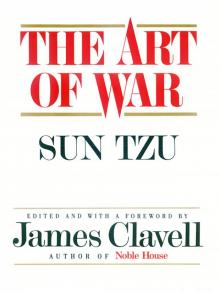 The Art of War
The Art of War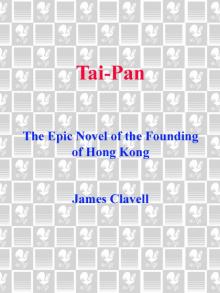 Tai-Pan
Tai-Pan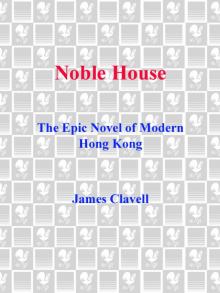 Noble House
Noble House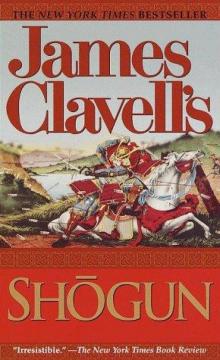 Shōgun
Shōgun Whirlwind
Whirlwind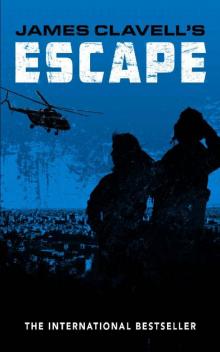 Escape
Escape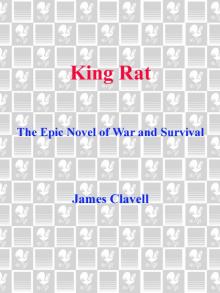 King Rat
King Rat The Children's Story
The Children's Story